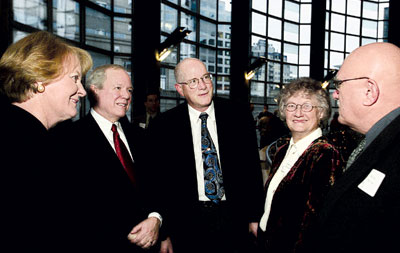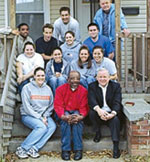Pushing the
Boundaries
SPU Aims to Take Its Vision to New Spheres
of
Influence and Effectiveness 
At SPU’s “Sacred Sounds of Christmas” concert in Benaroya Hall,
President Philip Eaton and Sharon Eaton (left) greet faculty member
Michael Macdonald (middle)
and alumni Sarah Adams Furtado ’51 and Frank
Furtado ’61. The concert is one way Seattle Pacific is reaching beyond campus
borders with the
Christian message.
I WAS SPEAKING to a group of
people recently,
and I said something, quite unintended, about
how much I love my work. As I made these
remarks, I was surprised by the intensity
that crept into my voice. I do love my work.
I love Seattle Pacific University. I love the
people with whom I work. I love the students.
I love the vision and purpose and mission of
this special place. I love learning, which is at the
heart of who we are as a university. I love that
we are given an extraordinary opportunity, as a
premier Christian university, of working to
change the world so that all of God’s children
may flourish.
Someone from the group then asked me, “Well, what in the world do you do all
day that you love so
much?” In other words, “Could you get a little more concrete for
us?” As I sorted through my mind what it is that gets me up in the morning, it
went something like this: I love most growing further and deeper into understanding
and articulating our vision of engaging the culture and changing the world. I
think it is extremely important that a leader love vision-work, and I do. I want
to do my part each day to see that this vision bears fruit and that the University
finds its focus and direction in a clear and compelling vision. I read and reflect
and listen; I talk and speak and write about this vision. I push, and I press
for others to do the same.
But I also answered the question in a way that surprised
some folks: I love the business part of my work. I love finding those strategic,
economic levers that allow us to allocate,
align, realign and increase our resources — so that our vision might bear fruit.
By the way, I don’t whisper about this love, as if this is some lesser part of
my work. I speak out about the economics of our work because I believe wholeheartedly
that vision only bears fruit when we provide and use resources well and wisely.
Can you imagine running a business with any bigger purpose than changing the
world with the love, light and grace of the gospel? This is about taking an institution
called the university, making sure everything is centered around the power of
the gospel, making sure we focus our work — graduating students of competence
and character; conducting clear, relevant and wise scholarship; modeling genuine
community — and then making sure we have the tools to get the job done well.
Providing the tools, the means, the resources — that’s the business side of my
work, and I get very excited about tackling this challenge each day.
Over the
last year and a half we have heavily invested our time and energies in understanding
better the economics of our business. And as we have sorted through all of the
economic variables — our costs and our prices, financial aid, balanced and increasing
revenue sources — I come to the conclusion that we stand at a crossroads, a pivotal
marker point in the life of Seattle Pacific. We can either coast for a while,
counting our blessings that we are healthy and that our momentum is strong, trusting
that we can weather whatever economic vulnerabilities we might have. Or we can
open a whole new chapter of taking our vision to new spheres of influence and
effectiveness.
Really, there is no choice. We are not about to sit still. At
this fork in the road, we are now launching a major new strategy that we will
be calling something like “broadening the
base.” The goals are quite ambitious. We must cast our net much wider than ever
before.
Broadening the base is in part a business strategy — to locate new markets, raise
funds and recruit students from across the nation and the world, and position
ourselves in whole new areas of support. Ultimately our desire is to strengthen,
diversify
and balance our sources of revenue.
But this strategy is ultimately and primarily
driven by a
desire to extend the reach of our vision. It means taking the risk
that our vision to engage the culture and change the world has
huge relevance for our time and for Christian higher education
across the country.
I find the story of the gospel of Jesus explosive, persistently
expansive, never timid, never content that the work is finished
or that the ground is covered. Seattle Pacific University is
called to participate in some small way in this grand,
far-reaching, exuberant story of life and love. That means
we must keep pushing the boundaries and broadening
the base, forging into new territory. And that’s exactly what
we plan to do.
— BY PHILIP W. EATON, PRESIDENT
— PHOTO BY MIKE SIEGEL

The
Sacred Sounds of Christmas Concert
December 1, 2002, Benaroya Hall, Seattle
President Eaton greeted a capacity Benaroya Hall audience of 2,400 at SPU’s
Advent choral and instrumental concert in downtown Seattle. The president
reaffirmed Seattle Pacific’s commitment to bring the finest in sacred music
to the heart of the Seattle community.
West Seattle Rotary Club
December 3, 2002, West Seattle President Eaton addressed the West Seattle
Rotarians on the subject of character and leadership.
SPRINT Team Trip
December 16–20, 2002, Jackson, Mississippi
SPU’s efforts to engage the culture include student SPRINT (Seattle Pacific
Reachout International) teams, which travel to locations throughout the
world for short-term mission projects. During Christmas break, President
Eaton joined a SPRINT team in Jackson, Mississippi. The group’s itinerary
had both educational and service components. Students learned about the
work of the John Perkins Foundation in Jackson and nearby Mendenhall, Mississippi,
 |
| Perkins (front center) and Eaton (front right) with the Jackson
SPRINT team |
seeing firsthand the poverty of the rural communities and the lingering
evidence of racial barriers. In addition, the group helped finish construction
of a Perkins Foundation house so that one fortunate family could move in
before Christmas. Another significant experience was a Bible study led
by Perkins and attended by Eaton and the rest of the SPRINT team.
The students
were appreciative that Eaton joined their group. As SPRINT team co-leaders
Ruth Kuhnau and Jennifer McKee related in an e-mail message back to campus, “We
just have to add how much fun we had with Dr. Eaton. Not only did he pray
and discuss things with us, he laughed and danced with us as well.” After
putting Eaton on a plane home, the students concluded, “It was sad to say
goodbye.”
Seattle Rotary Club January 8, 2003, Seattle
President Eaton offered the invocation at a meeting of the 715-member Seattle
Rotary Club, the second largest Rotary Club in the world.
Regional Events January 21, 2003, San Diego, California; January
22, 2003, Industry Hills, California; and January 23, 2003, Orange County,
California
Regional events featuring President Eaton begin with three locations in
Southern California. At each venue, Eaton addresses alumni, prospective
students and their parents, friends and local community leaders about the
University’s vision and the ways in which The Campaign for SPU will make
implementation of the vision possible. |
|
Back to the top
Back to Home

|
 |



Homecoming 2003!
On Homecoming weekend, SPU’s campus lights up with music, theatre, high-flying
hoops, the Talent Show and much-anticipated class reunions. [Campus]
An SPU Icon
Danna Wilder Davis completed what few others ever did at Seattle
Pacific: Between 1924 and 1939, she went from first grade to college
graduation in
consecutive years on campus. [Alumni]
Vocation, Vocation, Vocation
Three faculty-led initiatives received SPU’s 2002-2003 Faculty Grants for Theology
and Vocation. The grants support projects that weave vocational themes into
the curriculum. [Faculty]
Falcon Legends Hall of Fame
Six Falcon athletes become the inaugural group inducted into the Falcon Legends
Hall of Fame. Their athletic success and character make them legendary
individuals in Falcon sports history. [Athletics]
My Response
“I’m the father of an AIDS orphan,” says Tim Dearborn, dean of
the chapel at
SPU, as he recounts his teenage daughter’s trip to Uganda. There she visited
an AIDS orphan sponsored by the Dearborn family.
|
 |





